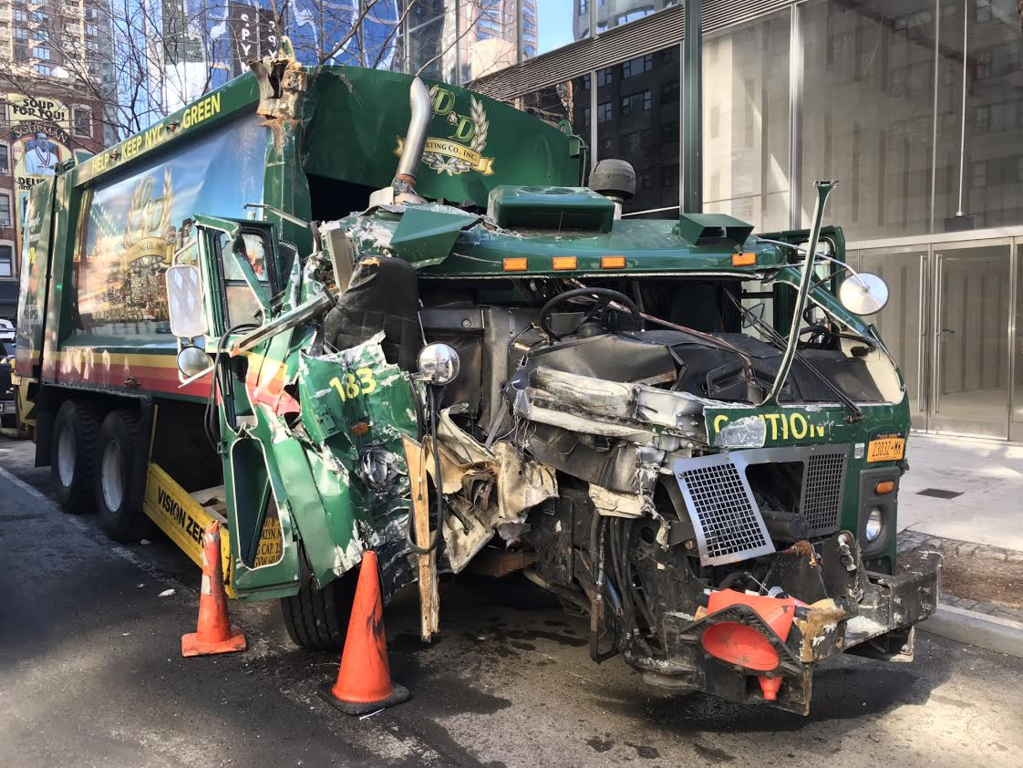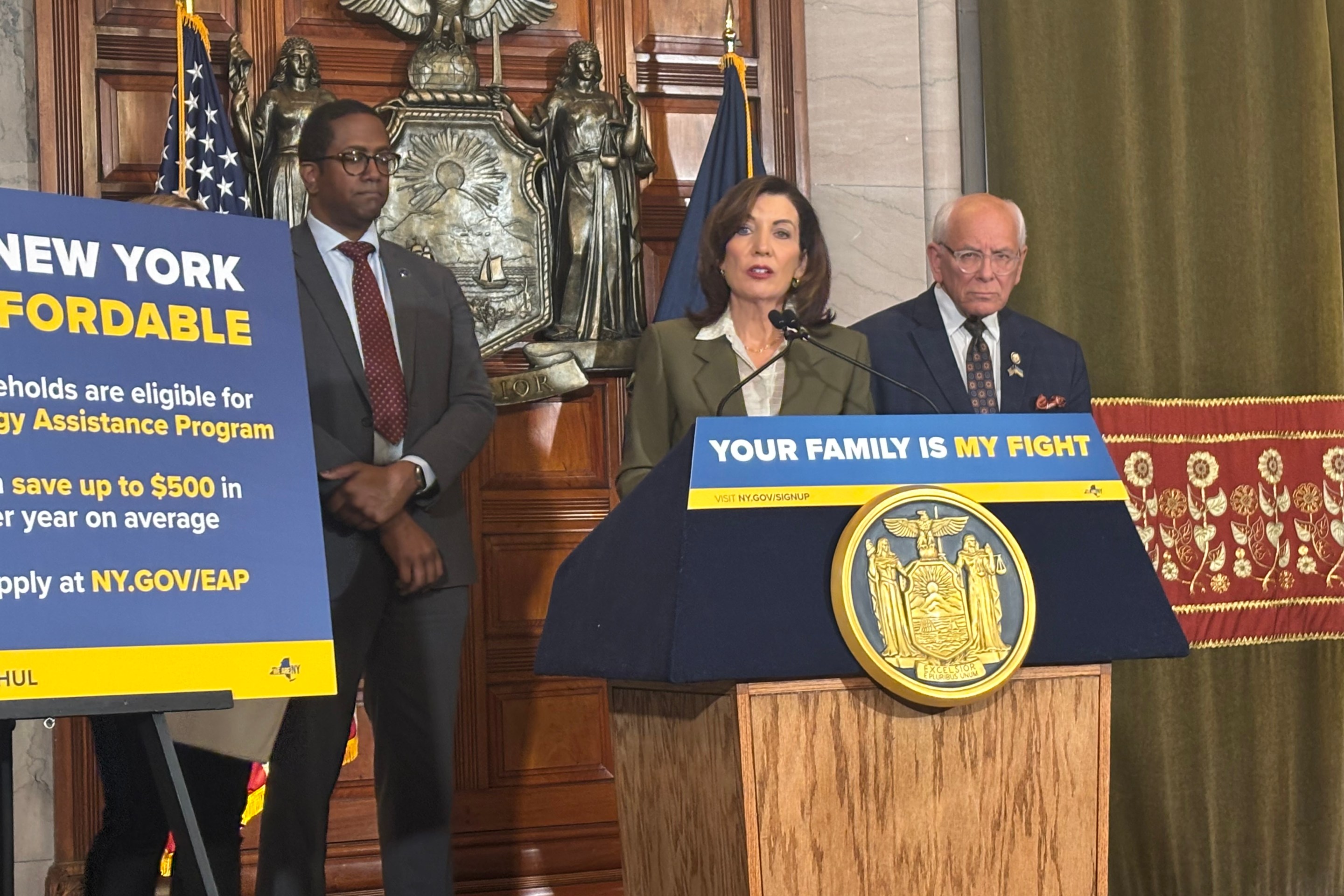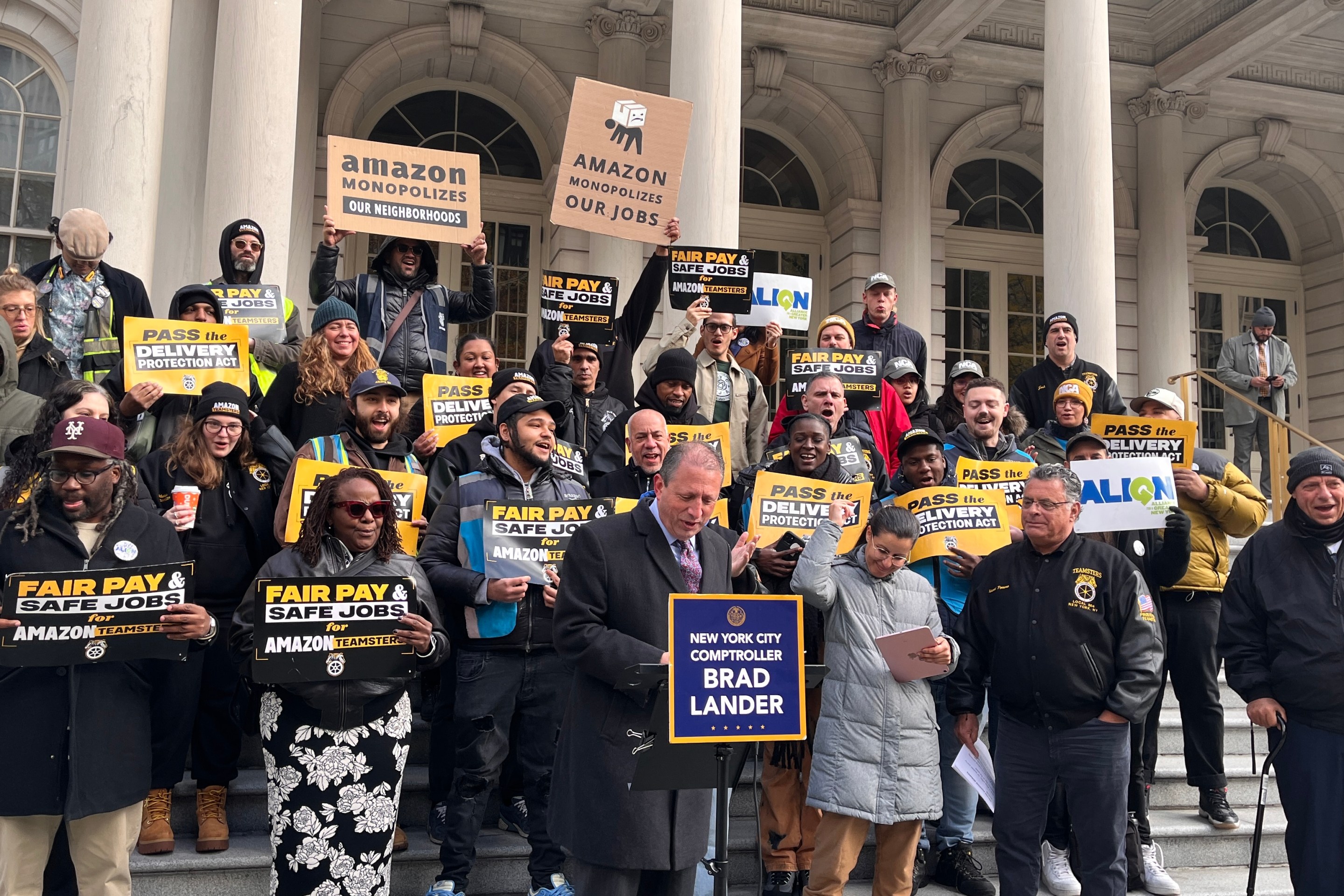If the city really wants to clean up the notoriously filthy private sanitation industry, it has a weird way of showing it.
On Thursday, the Business Integrity Commission, the agency responsible for regulating an industry that has killed dozens of people since 2010, held a "safety symposium" for the very companies that are fighting safety reforms — and invited a state official who blamed everybody but the companies for their poor record.
He even gave the companies tricks on how to "survive" state inspections.
"I’ve never seen a government official speak in that way," said Asher Freeman, legislative director for City Council Sanitation Chair Antonio Reynoso, who attended the meeting. "He essentially said if you give [inspectors] attitude, they’re going to be much more rigorous in their inspections than if you play ball and are nice to them."
Shocking Surveillance: A private garbage truck left a path of destruction early Saturday morning in Brooklyn. @LisaRoznerTV obtained this #exclusive video. https://t.co/SfOBYpXfEk pic.twitter.com/eBviPoz1N9
— CBS New York (@CBSNewYork) June 10, 2018
The presentation by state DOT Chief Motor Carrier Investigator Jonathan Nicastro was rife with victim- and worker-blaming rhetoric, according to both Freeman and a rundown published on Waste360.com.
Between 2010 and 2017, private carting companies killed at least 43 people on NYC streets, according to city data. The industry's high inspection failure rate is partly to blame: From March 2016 through February 2018, 55 percent of vehicles belonging to the city's 20 largest carters were taken out of service for violations like faulty brakes or lights, according to the Transform Don't Trash coalition.
Industry drivers say they're often forced to continue their runs even after they report malfunctioning equipment. In 2016, sanitation worker Carl Orlando told reporters about an incident when he crashed his truck into a telephone pole in order to avoid a more deadly collision when his brakes failed.
"Luckily, I didn’t hurt or kill anybody but if I did, that would have been on me,” Orlando said. "The company would have said I should have known better and they would have done anything they could do to put me at fault. There’s no reason why there should be trucks that are unsafe driving around these streets."
But stories like Orlando's were out-of-sight, out-of-mind at BIC's "safety symposium" on Thursday, which was co-sponsored by New Yorkers for Responsible Waste Management, the consortium of carters that seeks to stop attempts by the city to end the carnage.
I'm told the great @VCastroTV is going to use my seminal video of how private sanitation drivers drive...when they think no one is watching. Well, @vdimiceli and I were watching. See it all here or on CBS2 later: https://t.co/C0rpghrM72 pic.twitter.com/YPJd50dWWf
— Gersh Kuntzman (@GershKuntzman) February 1, 2018
Nicastro put the blame for those inspection failures squarely on the industry's beleaguered workers. At one point, he asserted that drivers, not companies, should be responsible for citations and summonses related to "something he or she should have noticed or could have fixed before taking out the truck."
"A driver shouldn’t go out with a flat tire, without lights on or with no seatbelt," Nicastro reportedly told the room of industry big-wigs. "But you have to make sure you’ve done your due diligence and trained them on how to do a good pre-trip inspection."
Not to outdo himself, Nicastro also blamed victims for their own deaths, noting the percentage of pedestrians killed in traffic crashes that are intoxicated. He revealed that the state had yet to start enforcing federal requirements for electronically logging driver work hours.
Disturbingly, Nicastro suggested that while driver fatigue is of the utmost importance, helpers — who lug trash into the garbage trucks — "can work until they're dead," according to Freeman. That's exactly what happened to 22-year-old Sanitation Salvage employee Mouctar Diallo, whose death last November was covered up by his employer for months before ProPublica exposed it.
In a statement to Streetsblog, Reynoso, a frequent critic of the industry who has called the safety symposia a "dog-and-pony show," blasted BIC and state DOT for the content of yesterday's event.
"When holding a safety symposium for an industry with a long track record of labor violations and poor fleet maintenance, it is deeply troubling that BIC would have a guest speaker who showed so little regard for these issues," he said.
An inquiry to state DOT was not returned.
New Yorkers for Responsible Waste Management also opposes a key safety measure: the Department of Sanitation's plan to institute a zone system for the private carting industry.
Under the current system, companies make deals with one business at a time, which leads to long and inefficient routes that exhaust workers and encourage carting companies and their employees to cut corners.
NYRWM members have been involved in many fatal crashes, but are rarely penalized by BIC. Sanitation Salvage, a former member of the group, had its operating license suspended earlier this year after the ProPublica investigation into Diallo's death. The company has since been reinstated.
"Private waste carters are the deadliest drivers in New York, and New Yorkers for Responsible Waste Management is how they launder their image to the public," Transportation Alternatives campaigns manager Jack Davies told Streetsblog. "It's long been obvious that the private carting industry isn't going to fix itself, and it's becoming increasingly clear that BIC is unwilling or unable to comprehensively address the dangers private carters pose to pedestrians, bicyclists, and drivers alike."
Streetsblog reached out to the NYRWM, and the group's Executive Director Kendall Christiansen said the group had made many “safety-related initiatives,” including: “Active engagement with BIC in planning all five of the safety symposia, encouraging industry participation, and conducting follow-up surveys; [supporting] knowledge and use of safety-related technology; [working] with BIC to plan, design, produce — and now implement – the ‘best practices’ manual; [promoting the] use of nationally generated safety-focused materials; and [supporting] New York State’s adoption of the ‘slow down to get around’ campaign.”
In a second email, Christiansen minimized concerns about safety in his industry by disputing city statistics about the 43 deaths. He also cast a recent crash involving a city Sanitation worker — who was immediately arrested and suspended — as evidence that the city doesn’t have the moral authority to criticize the carting industry.
The incident “underscores the daily challenge of creating a safety culture that translates into consistently proper behavior by individual drivers on their routes — without turning it into a ‘scorecard’ for politicization,” Christiansen said.






